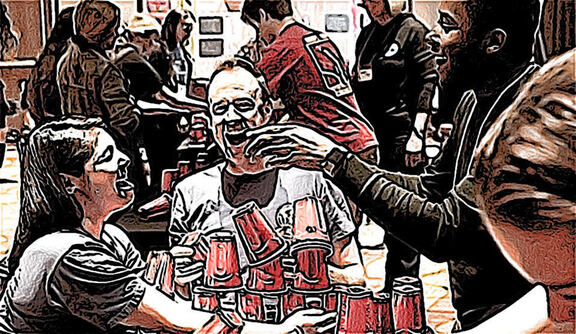|
Since moving to Colorado three years ago, I have met a lot of amazing facilitators in the area. Leo Shettler is such a person. After I saw him open with his frame, 'The Basic Skills for Being Human' I knew you would want to learn about it. Leo has kindly obliged. Thanks Leo, may this one live on forever. (So, amazing!)
"Imagine a school where everyone is kind and helpful and considerate to everyone there, teachers and students alike. Imagine walking down the hallways between classes and nearly everyone is smiling." from Leo
FRAMING 'The Basic Skills for Being Human'
Imagine a school where everyone is kind and helpful and considerate to everyone there, Teachers and students alike. Imagine walking down the hallways between classes and nearly everyone is smiling. No one is being pushed or shoved or bullied or yelled at or made fun of. Imagine that between every class at least a dozen other kids give you, and everyone else, a smile or a high five or a friendly greeting as they pass you by on the way to class. Imagine sitting in a classroom where no one is afraid to raise their hand to say they don’t understand something or to ask a question of the teacher. Imagine a school where the kid who used to always eat lunch alone in the cafeteria is now joined nearly every day by a compassionate student or two wanting everyone to feel they belong. Imagine a school where everyone wants to help everyone else succeed and be happy. Now imagine a workplace with the same kind of people, imagine a town, a whole world. How can we as individuals get on the right path to create this kind of school, workplace, country or world? What skills are needed? The activities and adventures you will be invited to participate in today are designed to help us all create such a school, such a workplace and such a world.
"But, before we get started on these adventures, I have three questions for you."
Question #1. Are some basketball players better at playing basketball than others? If so, how can you determine this?” (Students will respond by pointing out the sub skills of basketball. For example, shooting, passing, guarding, etc) Question #2. Are some bears better at being bears than other bears? (There will be a mixed reaction with participants taking opposite sides of this question. After some discussion about the sub skills of being a bear, such as finding food, climbing trees, mating, raising cubs, etc., there will be general consensus that some bears are better at being bears than other bears. The point of the discussion is to create an awareness that animals, including people, have sub skills that come with their nature and the better they are at performing those sub skills, the “better” they are as a creature. Question #3. Are some human beings better at being human beings than other human beings? (You will generally get blank stares of disbelief at this question. I remind them that I did not say “of more value than others” and that by observing the sub skills of basketball players and bears they were able to determine an answer to the first two questions.) So then, what are the most basic and fundamental skills needed in order to be a good human being? After participants list their opinions, I distribute a one page handout (PDF download below) listing, in alphabetical order, 14 basic sub skills of being human. One sentence at the top of the page states that the frequent practice of these sub skills will result in you becoming a better human being. The sub skills (sometimes called virtues) are listed with their definitions. Participants are asked to take turns reading these sub skills out loud. Finally, before starting the first activity, participants are asked to watch for good demonstrations of these sub skills from one another throughout the team building/challenge course activities and be ready to acknowledge others for demonstrating the sub skills. (Leo's shares, "Through my observations, acknowledging a person for any behavior tends to reinforce that behavior and increase one’s desire to become even more skilled at it." Practicing these sub skills can help us be more 'human'.)
The Basics Skills for Being Human, Handout
Thanks again to Leo for helping us learn and grow. Let us know how this works for you.
All the best to you! Chris Cavert, Ed.D.
Would you like a (super) quick email notification when new OTB content (blog post or podcast episode) is available? Fill out the form below and we'll let you know.
0 Comments
Your comment will be posted after it is approved.
Leave a Reply. |
OnTeamBuilding is a forum for like-minded people to share ideas and experiences related to team building. FREE Team Building
Activity Resources OTB FacilitatorDr. Chris Cavert is an educator, author and trainer. His passion is helping team builders learn and grow. Archives
January 2024
|
||||||



 RSS Feed
RSS Feed